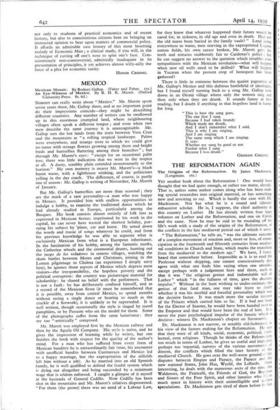THE ANATOMY OF THE TARIFF IN The British Tariff System
Mr. McGuire aims "to provide a comprehensive description of the protectionist system that has for some years been in force in Great Britain." A praise- worthy aim ; for quite apart from the grosser economic imbe- cilities which cumber controversy on tariff matters, the pros and cons of particular moves are too often debated in a vacuum, without account being taken either of the adminis- trative side of the question or of secondary economic reper- cussions. Mr. McGuire attains his object by dint of dogged persistence and a methodical habit of mind, and the result is a valuable—although rather depressing—study. It is not, of course, wholly exhaustive ; short of including every item in the tariff at every stage of its history it could hardly be made so ; but the answers to most general questions of fact relating to commercial policy and customs practice may be found in its pages. Mr. McGuire deals with the historical background of indirect taxation, with the technique of specific and ad valorem duties, with the details of customs and excise pro- cedure, with licences, drawbacks and warehousing, with the balance of protective and revenue considerations in the exist- ing tariff, with Imperial Preference and with commercial bargaining, including a stop-press sketch of the Anglo- American Trade pact. This specific matter is prefaced by a rapid survey of the constitutional and economic backgrounds to give the necessary perspective of principle.
The various sections of the book differ considerably in completeness, in detail, and—one must add—in merit. The lightning outline of economic theory which precedes Mr. McGuire's examination of the tariff is so sketchy that its use- fulness is doubtful ; clear enough, after a little mental ampli- fication, to any reader already versed in the principles which it enunciates, it can hardly be other than cryptic to the un- initiated who are really the only ones to need it. (It also contains generalisations—such as that Income Tax enters into industrial costs—which are, to say the least of it, hardly har- monious with recognised economic analysis, and with the conclusions of the Colwyn Committee.) The chapters on administrative practice and problems seem, by contrast, over- weighted ; valuable as they are in themselves, one cannot help grudging them some of the space which might have been devoted to a clearer and less cramped discussion of wider principles. Indeed, one feels the grudge more strongly on finding Imperial Preference and commercial treaties discussed wholly without reference to their vitally important repercus- sions in international politics, without more than a brief mention of the new technique of trade warfare as practised by Germany, and with the barest allusions to the problems of international exchange stability, the breakdown of the go'd standard, and the technique of clearing. True that these sub- jects do not fall directly under the heading of the book's title ; but the British tariff system cannot be realistically considered apart from the contemporary world order which it has so powerfully affected. The nearest that Mr. McGuire comes to appreciating the political consequences of Ottawa is to say : " The non-Empire producer might be gradually squeezed. It is not to be expected that he would suffer this passively. . . . Cartels would arise. . . . If these did not succeed then blocks of non-Empire peoples would combine . . . to oppose the British Empire." This string of conditionals would have been appropriate enough in 1932; but in 1939! From Berlin, Rome, and Tokyo—not to mention Spain, Central Europe, China and Abyssinia—there return loud and ironic echoes to his surmise.
Yet despite its omissions, its lack of balance, and the inevit- ably pedestrian slowness of its pages of administrative minutiae, The British Tariff System is to be recommended not only to students of practical economics and of recent history, but also to conscientious citizens bent on bringing an instructed opinion to bear upon matters of commercial policy. It affords an admirable case history of this most besetting malady of Economic Man ; a clinical study, if you will, in the technique of cutting off one's nose to spite one's face. Con- scientiously non-controversial, admittedly inadequate in its presentation of principles, it yet achieves almost willy-nilly the force of a plea for economic sanity.
HONOR CROOME.







































 Previous page
Previous page